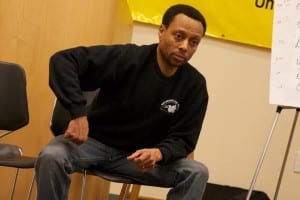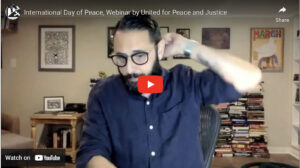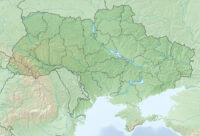UFPJ’s OCCUPY PEACE SUMMIT
February 24-26, 2012
Nearly 100 activists from a wide range of local and national peace organizations attended UFPJ’s OCCUPY PEACE SUMMIT, February 24-26, 2012 in Philadelphia. They brought energy, compassion and commitment to the work of assessing the challenges and the opportunities facing our movement. We left Philadelphia with plans for UFPJ to initiate an Iran Pledge of Resistance [IPOR], a grassroots campaign to build an emergency response network capable of preempting any escalated U.S. intervention in Iran or the Middle East. And, we began strategizing about how to confront the corporate power that stands behind the U.S. war machine.
Our plans reflected analysis of the current political moment. Those who were part of OCCUPY PEACE agreed that 2012 can be one of the most significant years for organizing in a long time, but we need to be doing our organizing differently. We identified three crucial themes:
- The need to focus on local organizing;
- The opportunities to broaden our narrative about the human, economic and environmental impacts of war; and
- The necessity to build a base of power that reflects the synergies among the peace movement and the movements to oppose racism, defend civil liberties, and end poverty.
Above all, the rise of the Occupy Movement presents an unprecedented opportunity to bring our issues to other peoples’ meetings and demonstrate how war affects us all.
We must step boldly into this moment and we must do it together!
Fortunately, UFPJ is presently well positioned to support this work. Over the last three years, UFPJ has become what is best understood as a hybrid of a network and a coalition. The UFPJ “network” shares information and resources, provides space for member groups to discuss public policy and helps to mobilize local grassroots activism through action alerts. In the role of “coalition,” UFPJ provides space for member groups to organize, lobby, mobilize, and take direct action. At one time UFPJ could count over 1,400 groups as part of our organization; many of these have ceased to exist and there are now around 300 active groups. UFPJ has recovered from being tens of thousands of dollars in debt. We have a modest $23,000 in the bank with a general operating cost of less t
han $4,000 a month. Currently, a Coordinating Committee of nine members and two part-time staff are moving the bulk of UFPJ’s work. We have four working groups: Afghanistan, Nuclear Disarmament/Redefining Security, Legislative, and International.
Based upon what we heard from the participants at OCCUPY PEACE, UFPJ members are working on a wide range of issues. At a local level there is broad-based interest in the Move the Money campaign, public schools, and health care. Environmental concerns – climate change, fracking, and creating green-collar jobs – were raised by many. Iraq, Afghanistan, and increasingly Iran are on everyone’s agendas – with much discussion of the unfinished business of th
e war in Iraq (a continuing refugee crisis and the need for reparations) and the urgency of finding diplomatic solutions to the war in Afghanistan and escalating conflict with Iran. Issues concerning the military were numerous: racism and sexism in the military, the need for counter-recruitment, Operation Recovery (taking care of the troops). How we
fight wars, especially the increased use of unmanned drones is raising difficult legal and ethical issues. People are also concerned about the militarization of law enforcement at home. Working to abolish nuclear weapons and power, and to create a weapons-of-mass-destruction free zone in the Middle East is ongoing. Organizing for Anti-NATO/G8 activities is widespread. And many people mentioned war-profiteering corporations and how they lead us into wars while corrupting our democratic institutions as key.
Saturday’s discussions ended with extensive agreement by OCCUPY PEACE participants: If we are going to shift from the current War Economy to a Justice Economy, we must talk about capitalism! Sunday’s session did just that as we honed in on three areas of work:
 The Iran Pledge of Resistance [IPOR]
The Iran Pledge of Resistance [IPOR]- Confronting Corporate Power
- Anti-NATO/G8 Organizing and the Chicago Counter-Summit 5/18 & 19
There was great enthusiasm for UFPJ to launch a grassroots campaign to oppose military action against Iran. People will be asked to make a pledge to join with others to engage in acts of legal protest and/or nonviolent civil disobedience if the United States applies increased sanctions, invades, bombs, sends combat troops or drones, or otherwise significantly escalates its intervention in Iran or the region. The should be many opportunities to increase participation during the training of 100,000 people in nonviolent direct action during the 99% Spring.
The IPOR campaign will also include development of educational materials, promoting the facts about Iran’s nuclear program, and supporting the Iranian people (not their government). “No war, no sanctions, no repression!” Ultimately we want the campaign to expand to include broader analysis of the Middle East Crisis, including Israel/Palestine and the unfolding situation in Syria.
Turning to issues of challenging corporate power, we observed how two trends are converging in the current political moment. On the one hand, the Occupy Movement is a revolutionary, anti-capitalist movement that is horizontal and people-powered. On the other hand, the Corporate Accountability Movement aims to reform corporate and banking practices. There are many opportunities ahead to challenge war corporations and banks, and to link our issues to housing, education, environmental justice, worker and immigrant rights. These include Wall St. events and shareholder meetings, especially the upcoming annual meeting of the Bank of America in North Carolina. There is also a great need for campaigns focused on war corporations: drone, weapons and tear gas manufacturers, oil, gas and nuclear companies, and security firms.
A great deal of research needs to be carried out to support this work and link it with campaigns of other movements.
- Which war corporations are in our communities?
- Which companies are behind the growth of the security state?
- Which war corporations are unionized?
- What is the impact on jobs of contracts/cutting contracts for war corporations?
This work will require long-term commitment. We need our own “think tanks.” We need to learn what corporations are in our communities and what they do. We can make local links to the Military Industrial Complex – especially universities.
Lastly, we discussed Anti-NATO/G8 Organizing and the Chicago Counter-Summit, May 18 and 19. Submit proposals for workshops at: Natofreefuture.org Many teaching resources have been developed. UNAC is organizing a Protest March on May 20. The Nobel Laureates are also meeting in Chicago.
At the conclusion of our two days together, we came away believing that UFPJ definitely has work to do. We hope to convene more regional meetings like OCCUPY PEACE in other cities in order to build more support for our campaigns and to strengthen ties with other movements across the country. Together we can make 2012 a year of exceptional organizing to end war and win true justice for our communities and our planet.


